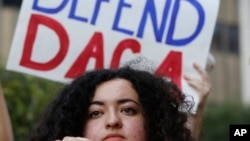The U.S. Supreme Court on Friday granted a request by President Donald Trump's administration to block the immediate release of documents concerning his decision to end a program that shielded from deportation hundreds of thousands of young adults brought into the country illegally as children.
The justices put on hold an order by a federal judge in San Francisco for the administration to turn over the internal documents as part of several lawsuits he is overseeing, including one led by California's Democratic attorney general, challenging the legality of Trump's September decision.
The court's action will remain in effect until the justices decide whether to permanently block U.S. District Judge William Alsup's order in the lawsuits regarding the Deferred Action for Childhood Arrivals (DACA) program created by Trump's Democratic predecessor, Barack Obama. Under Trump's action, the protections offered by DACA disappear in March.
The lawsuits accuse the administration of violating the U.S. Constitution's due process guarantee as well as statutory legal requirements for such a move.
Program rescinded
Since its inception, the DACA program has provided protection from deportation and work permits to about 800,000 mostly Hispanic young adults brought into the United States illegally by their parents. At the time Trump announced the rescinding of the program, about 690,000 people were protected under DACA.
Trump rescinded the program as part of his hard-line immigration policies, calling DACA an unconstitutional overreach by Obama. Trump gave Congress until March to come up with new protections for what are commonly called "Dreamers." That term comes the DREAM Act, which would have provided protections similar to those in DACA but was never passed.
Dreamers are a small fraction of the roughly 11 million illegal immigrants in the United States.
A federal appeals court had upheld Alsup's order that an expansive trove of documents be handed over, prompting the administration to turn to the Supreme Court.
Blocking the document release could hinder the lower court's ability to rule on the case before the program expires, according to the plaintiffs.
Obama and his fellow Democrats have defended the program as one that protects young people who grew up and were educated in the United States and are Americans in every way but actual citizenship.





